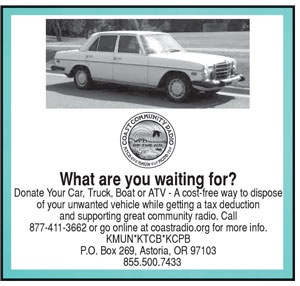Couple comes to Elochoman Valley with dream of a Renaissance town
October 4, 2018

Diana Zimmerman
J.D. and Shira Honoré hope to create a fully immersive experience at an Elochoman Valley farm.
"A unique welcome awaits you," says one sign greeting visitors to Cathlamet.
J.D. and Shira Honoré certainly got that.
Most of it has been curious, kind, and respectful, according to J.D., but he is generous.
And those four adjectives just happen to be a great way to begin to describe the couple themselves.
They are two interesting, friendly, creative people. They dream of being able to share the fruit of the vision they have for their new 40 acre homestead with their new community.
They are also kind of nerdy, which in this day and age equates with cool. So add knowledgeable, animated, and passionate to their curiosity, and you might start to get a handle on them.
What are they dreaming of? A co-op and a reenactment village.
First of all, this is not a commune. Their motivations are educational not religious. Yes, a couple friends and family members will live with them, but it's going to take some bodies and hard work to bring their big dreams to life.
"We're normal," Shira said. "We just like good food and renaissance fairs."
Second of all, these big dreams aren't happening in a hurry.
"We have so much work to do," J.D. said. "We're financing this. We're not wealthy. I'm a disabled vet. She's a nurse. You can do the math on that. That's not a lot of money."
The Big Dream, Part 1:
The Co-op
Hoping to be self sustainable, their business plan begins with a co-op, but there is still much to do before even that happens.
"We want to have some aquaponic greenhouses and restore the barn to what it was 100 years ago," J.D. said. "That's kind of a first step for us. It's a great barn. Mr. Strueby left it in great condition."

"It also seems like it is a landmark of the community," Shira
added, "and that is something we are not going to mess with."
"When it comes down to it, we are historians. That is what we do," J.D. said.
Upstairs will become a venue, and downstairs they hope to turn the cow stalls into spaces for people to rest and relax during and after events.
They want sheep and goats for pasture management. J.D. estimates that each aquaponic greenhouse could feed 30 pescatarians. There will be chicken, and eggs, pork, sheep, and goats.
"That's a lot of food," J.D said.
That doesn't include the orchards they have planned, which will include figs, and several varieties of cherries, apples, and pears.
The aquaponic farming will be one adventure, but J.D. has also been studying agricultural practices and is excited to try out espalier, a special kind of pruning for more efficient harvests in the orchard.
"The goal is for it to be self sustainable, to have enough revenue to pay for itself," Shira said. "Our goal is not to make a whole lot of money from the co-op."
But maybe one day, they hope they make enough to pay for full health insurance for all co-op members.
"We want community members to be part of the co-op," J.D. said. "It's $50 a month and five hours a week working. The $50 isn't to pay us, you're paying for the feed and for the electricity to run the place. Whenever we are harvesting, you'd get a ton of food. Theoretically one person working in the co-op could feed two people, maybe three with healthy food!"

The Big Dream, Part 2: Reenactment Village
Shira is from "oh God awful" Los Angeles. J.D. was born in San Diego, a military brat who moved often as a child and can't claim one place as home.
They met at a renaissance fair.
"They are so much fun!" Shira said.
She started at an animé convention, and when one thing led to another, she ended up joining a guild after attending one renaissance fair.
J.D. was really into sci-fi, fantasy fiction books and movies. One day, while in his first year of college in San Diego, someone passed him dressed in garb.
"Where did you get these clothes, and why are you dressed like you should be in Lord of the Rings?" J.D. asked.
"We're going to a renaissance fair," he was told.
"A ren-ah-wa-hoo-what?"
The man wrote down the address and suggested he check it out. Curious, he found two people to go with him. He was not about to take this on by himself.
"I had to hold my jaw off the ground," J.D. said. "it was amazing. There were people juggling, a fire dancer, a king and queens procession, smoked turkey legs, Washer Wenches."
"During the time, the wives would get together and wash clothes," J.D. explained. "They were known historically to sit around talking and laughing, gossiping. Now there is a comedy show."
"The beautiful thing about faires in reenactment is that it makes you want to learn," J.D. said, "Shira knows clothing and sewing. I started learning more about the time period and the food."

The one thing that was always missing was authenticity.
"When you go to a festival, everything feels fake, everything looks fake," Shira said. "There is also a problem with what we call live dioramas, when the acting guild are all in their garb..."
"...and they fence themselves off," J.D. finished.
So the two began to think, what if they could create a fully immersive experience versus a facade? What if everyone was required to wear garb?
"We wanted a renaissance town, but we didn't want it to be consumer based," Shira said. "A lot of them are, and they need to be."
J.D. acknowledges that he has heard a lot of concerns about size and traffic.
They own 40 acres. The structures they are planning for what they are calling the Town of Taylor will take up about 1.5 acres, and the entrance will not be on the main road. It will also be on the portion of land farthest away from neighbors' homes.
"We intentionally put it far away from everybody," J.D said.
It suits them as well. For a fully immersive experience, visitors shouldn't have power lines or modern homes in their sight lines.
There will be an entrance, where visitors will visit a tailor. They will have to purchase or rent period clothes, or garb, to go any further. Because education is the driving force, visitors will learn about fabrics, styles, and dyes while they work with the tailor.
"It's better for everyone that way. You can't wear t-shirts and jeans," J.D. said. "Just like you get dressed up for dinner, you get dressed up to get into town."

They are planning 14 shops and apartments total. The apartments will be offered at a reduced price to co-op members and will be modern, but nothing else will be. The people that live there will be required to wear period clothes, and shop owners will practice crafts of the day, including baking, tanning, blacksmithing, candle making, and more.
In those shops, visitors can learn about 16th century baking, leather making, candle making and more.
J.D. believes that requiring visitors to wear garb will immediately cut down on the number of visitors they can expect.
"We are not Disneyland," Shira said. "We do not want to be Disneyland."
Concerned about neighbor's happiness, they had already concocted ways to control the numbers of visitors to their small, future reenactment village.
The way J.D. has it set up, he believes that even if no one visits, they remain self sustainable.
Along with the apartments and shops will be an inn, with a "high quality food tavern" below, and 16th century hotel accommodations upstairs.
That's right. No running water. No electricity.
The concern for their neighbors and interest in creating community is also evident in their spoken desire to not compete with other businesses.
"We want to work with people," J.D. said. "We are caretakers of the land. If it becomes a burden on the land, a burden on the community, the neighbors, on ourselves, we plan to set limits."
"I think it will benefit the people who are financially invested in this town," Shira said. "If a lot of people show up for a fair, there will be overflow into Cathlamet, people needing places to stay and eat, wanting to spend their money at the market or the farmer's market."
Meet J.D. and Shira when they hold a meet and greet on October 18, at 7 p.m. in the Wahkiakum Community Center on Main Street in Cathlamet.






Reader Comments(0)